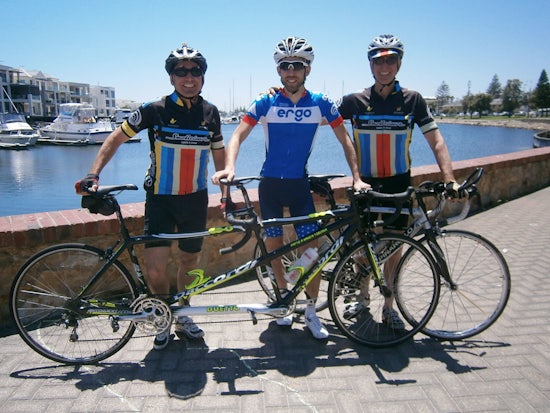Pedalling on with dementia
As Tour Down Under cyclists put their skills to the test on South Australia’s roads this week, another cyclist in Adelaide is facing a different challenge.

(L – R) David Ball and David Parsons on the tandem are joined by Syd Ball at Glenelg
Diagnosed with younger onset dementia (YOD), 55-year-old keen cyclist David Ball is able to continue pedalling thanks to dedicated family and friends, and the Tandem Project, a Road Development Program for paracyclists in South Australia run by Team Euride Mercedes-Benz Adelaide Cycling.
Officially diagnosed in 2012, David’s wife, Nele believes he’d actually started showing symptoms as early as 2007. “We thought initially it was depression and there was a wrong diagnosis early on too,” Nele says.
As it turned out the symptoms were part of YOD, a diagnosis that changed their world dramatically. “Our 14 year old daughter found it very difficult to cope with,” she adds.
But throughout it all, his family and cycling have been a constant in David’s life. David’s older brother Syd, says they have always ridden bikes – cycling to school and their father even welded two bikes together to make a tandem when they were in scouts! Over the past few years, the brothers had enjoyed regularly cycling in a group called the ‘Smokkelaars’.
As David’s condition advanced, it became more apparent he wasn’t safe on the road on his own, and even riding in a group could be dangerous. However, with help from the cycling community, they were able to be a part of the Tandem Project, a program helping train paracyclists, usually with a visual disability, ride tandem and develop into competitive pairings at State and National level.
Director of Ergo Fitness David Parsons has been part of the Tandem Project for several years, most recently competing as a pilot (the person at the front of the tandem) for the world renowned Paralympic cyclist and multiple gold medallist Kieran Modra (the person at the back, referred to as a stoker).
Mr Parsons has been piloting for David and hopes eventually Syd can be trained in the role to ride with his brother. “There is more to riding a tandem than most people realise,” he points out.
As the stoker has no control over the direction of the bike, there has to be a lot of trust between the two riders. Mr Parsons points out a tandem is longer than a normal bike, and likens being a pilot to driving a car with trailer. “You’ve got to remember where the trailer is when you overtake and pull in,” he says, also highlighting the tandem is heavier than a normal bike so this affects breaking.
Tandem Project team captain Mike Hoile says helping people like David wasn’t normally something the project was involved in. “But we’re happy to help out where we can,” he says. “The most important thing is David’s safe when he’s out riding, but I’d be delighted if he could get into races – he’s quite an athlete.”
Before he became ill, Nele says David was very active, taught Chinese and German and took overseas trips. While she says his care at Norman House, where David goes for respite care, is excellent and he does other activities such as playing golf and photography lessons, she believes the whole industry needs to make some changes for people with YOD.
“Facilities aren’t engaged and the staff aren’t property trained,” says Nele. She points out someone with YOD and their family are at a very different stage of life.
“The government is not taking this seriously – you can’t expect a 55 year old with dementia to do the same activities as an 80 year old because their interests are diverse and their care needs to be more individualised.”
Nele says riding is good for David, not only physically and mentally, but he’s still in the community doing things he enjoys. “Bike riding is what David loves, he’s strong and has a good sense of balance; it’s what he wants to do and what he can do.”











